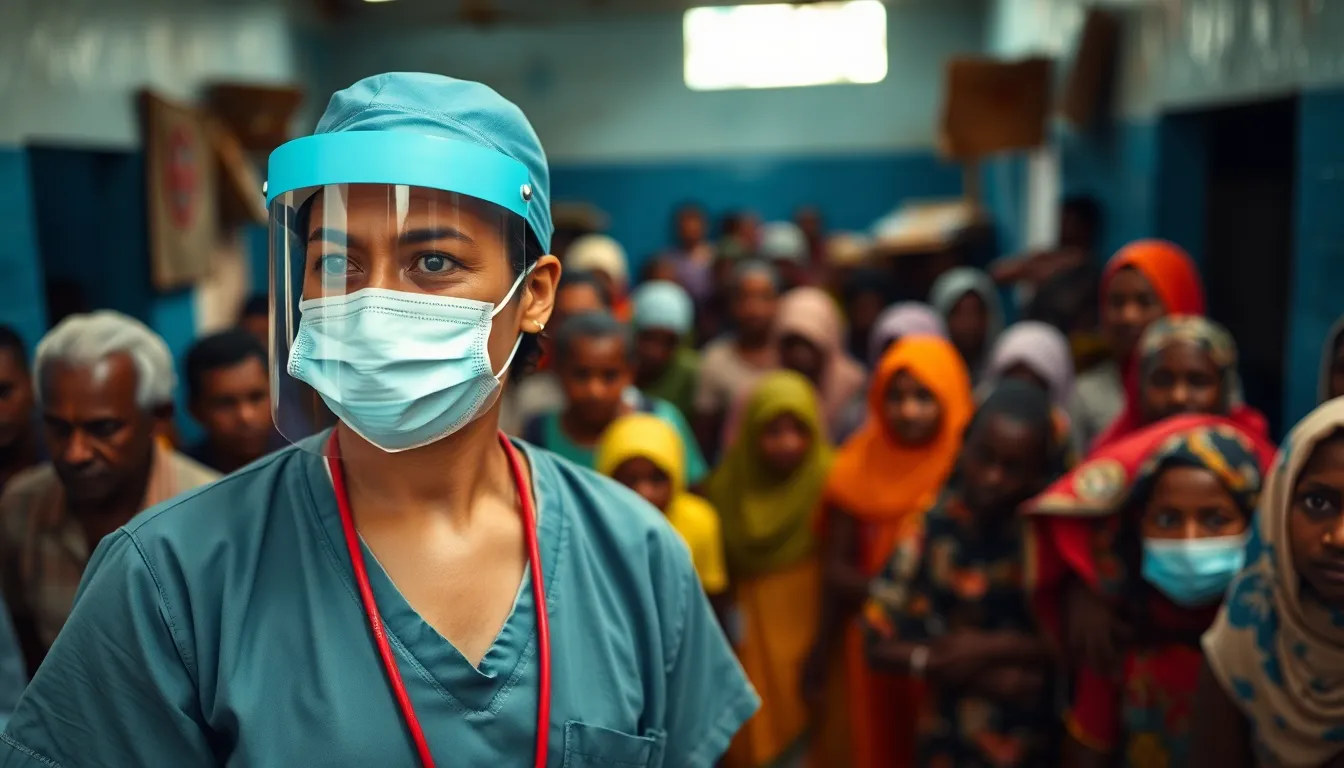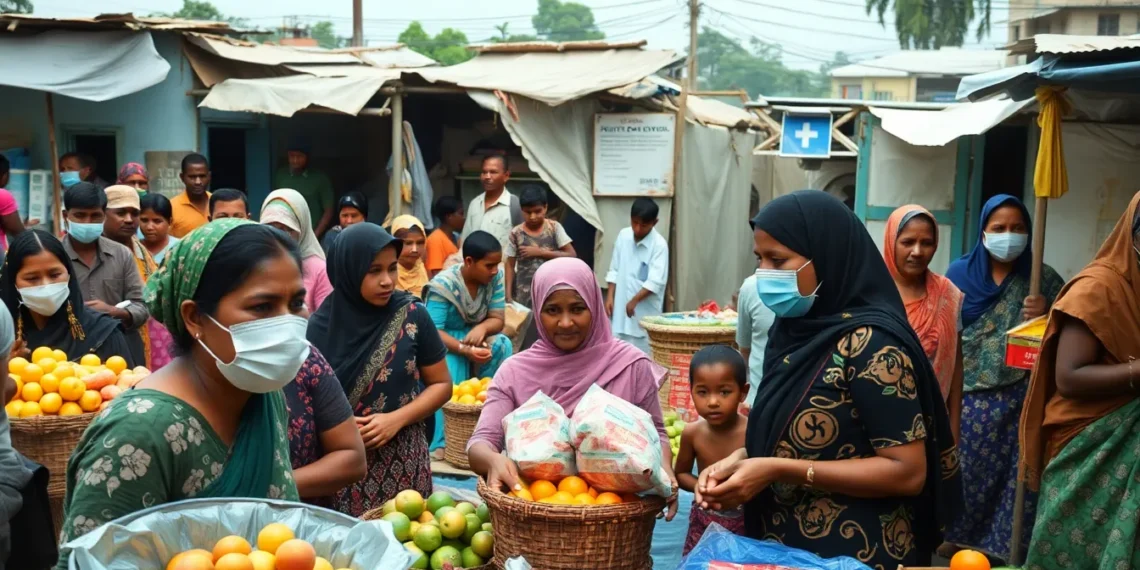As the world grappled with the chaos of COVID-19, the Global South faced a unique set of challenges that felt like a bad plot twist in a thriller movie. Health systems strained under the pressure while livelihoods hung by a thread, making it clear that the pandemic was more than just a health crisis—it was a test of resilience.
Imagine trying to juggle flaming torches while riding a unicycle on a tightrope. That’s what many communities in the Global South experienced as they navigated the dual threats of disease and economic instability. This article dives into the intricate web of health and livelihood challenges, highlighting the innovative solutions and relentless spirit that emerged in the face of adversity. Buckle up for a journey that reveals not just the struggles but also the triumphs of those who refused to back down.
COVID-19 Global South Health and Livelihoods Challenge
COVID-19 significantly impacted health systems across the Global South. Many countries faced overwhelmed healthcare facilities, limited access to medical supplies, and shortages of healthcare workers. Economic disruptions occurred as lockdown measures led to mass unemployment and reduced incomes.
Livelihoods were profoundly affected, particularly in sectors such as agriculture and tourism. Vulnerable populations, including informal workers, saw their earnings plummet, pushing many further into poverty. According to the World Bank, an estimated 88 million to 115 million people may have fallen into extreme poverty due to the pandemic.
Education systems also experienced unprecedented challenges. School closures disrupted learning for millions of children, with many lacking access to online resources. Disparities in technology access deepened educational inequalities among socio-economic groups.
Mental health concerns grew alongside physical health issues. Isolation, economic uncertainty, and fear of disease contributed to increased levels of anxiety and depression. Communities strengthened support networks to address these mounting challenges.
In response to these crises, innovative solutions emerged. Telemedicine provided remote consultations, while community health initiatives strengthened response capacities. Local governments and organizations collaborated to distribute food and resources, demonstrating resilience and solidarity.
The Global South’s response highlighted the need for sustainable development practices. Long-term strategies emerged to build robust health systems and foster economic resilience. Lessons learned from the pandemic stress the importance of prioritizing health and livelihoods simultaneously for future preparedness.
Health Challenges Faced by the Global South

The COVID-19 pandemic intensified various health challenges within the Global South, highlighting existing disparities in healthcare access and mental health.
Access to Healthcare Services
Access to healthcare services proved difficult for many communities in the Global South. Overwhelmed healthcare facilities struggled to manage patient loads, resulting in long wait times and inadequate treatment. Disruptions in supply chains led to shortages of essential medical supplies and personal protective equipment, leaving healthcare workers at risk. Vulnerable populations often faced economic barriers that limited their ability to seek care. The World Bank reports that 88 million to 115 million people may have slipped into extreme poverty during this crisis, compounding difficulties in accessing health services. Rural areas struggled most, lacking infrastructure for timely medical interventions.
Mental Health Implications
An increase in mental health concerns arose due to the pandemic’s stressors. Isolation, fear of illness, and economic uncertainty escalated anxiety and depression rates in communities across the Global South. Limited access to mental health resources further complicated these issues. Traditional support systems experienced strain, as social distancing measures disrupted community interactions. Many individuals found themselves without the emotional support networks usually relied upon during hardship. Community organizations stepped up to address these challenges, offering remote counseling and mental health awareness campaigns. Strengthening mental health resources became critical in fostering community resilience during turbulent times.
Livelihood Challenges in the Global South
COVID-19 significantly challenged livelihoods across the Global South. Economic instability and rising poverty characterized this period.
Economic Disruption and Unemployment
Lockdown measures resulted in widespread economic disruption. Many businesses faced closures, leading to mass unemployment. Agricultural sectors saw diminished activity, which directly impacted food security. Tourism, another vital industry, experienced steep declines in visitors. Consequently, income levels dropped sharply, pushing millions into poverty. According to the World Bank, an estimated 88 million to 115 million people entered extreme poverty as a result. Small-scale entrepreneurs and informal businesses struggled to survive, highlighting the fragility of their economic foundations.
Impact on Informal Workers
Informal workers, who comprise a large portion of the workforce, faced severe hardships. These individuals lacked job security and access to benefits. Without steady income, many couldn’t afford basic necessities during the pandemic. School closures further complicated their situations, as families relied on their earnings for educational resources. Health concerns also loomed large, inhibiting their capacity to seek care. Community organizations played a vital role in providing aid, but challenges remained prevalent. The gap in support highlighted the need for stronger labor protections and safety nets for informal workers.
Response Strategies Adopted
During the COVID-19 pandemic, the Global South implemented various strategies to address health and livelihood challenges. These responses involved coordinated efforts at both government and community levels.
Government Initiatives
Governments across the Global South enacted numerous initiatives to bolster health systems and support vulnerable populations. Financial aid packages provided immediate relief to those impacted by job losses, ensuring food security for millions. Local authorities facilitated access to healthcare services through mobile clinics and telemedicine, significantly improving outreach in rural areas. Health education campaigns informed communities about preventive measures, helping to curb the spread of the virus. Additionally, collaborative efforts with international organizations secured crucial medical supplies, addressing shortages and enhancing overall healthcare response capabilities.
Community Support Networks
Community support networks played a critical role in mitigating the effects of the pandemic. Local organizations mobilized to distribute food and essential resources, reaching the most vulnerable families. Volunteers often stepped in to provide remote learning resources, assisting children who faced educational disruptions. Mental health initiatives, led by grassroots groups, offered counseling and support sessions, prioritizing emotional well-being amidst the chaos. Encouraging community solidarity, these networks fostered resilience and highlighted the strength of collective action during challenging times.
Long-Term Implications for Health and Livelihoods
The COVID-19 pandemic introduced significant long-term challenges to health and livelihoods in the Global South. Health systems continue to operate under strain, with many facilities still lacking adequate supplies and trained personnel. Vulnerable populations remain particularly at risk, as access to quality healthcare often suffers due to continued economic barriers.
Economic instability persists with many individuals facing ongoing unemployment. Sectors dependent on tourism and agriculture still struggle to recover. Informal workers experience chronic insecurity, as job opportunities remain scarce and unpredictable. The World Bank projects that during the pandemic, 88 million to 115 million people may have entered extreme poverty.
Education systems experience lingering disruptions, with ongoing gaps in technology access hindering learning for millions of children. Children in rural areas often lack the resources for remote learning, exacerbating educational inequalities. Mental health challenges, having surged during the pandemic, continue to affect communities. Rates of anxiety and depression increase, while access to mental health services remains limited.
Innovative solutions have emerged as a response to these enduring issues. Telemedicine gained traction, allowing for remote consultations, thereby increasing access to healthcare. Community organizations play critical roles in supporting mental health initiatives and distributing resources, highlighting local strengths. Sustainable development practices are now more crucial than ever, focusing on building robust health systems.
Governments and organizations are encouraged to collaborate on long-term strategies aimed at preserving health and livelihoods. Mobilizing community support has proven effective in mitigating the pandemic’s impact, emphasizing the significance of resilience. Prioritizing a dual approach not only prepares for future crises but also promotes healthier, more sustainable communities.
Conclusion
The COVID-19 pandemic has revealed the vulnerabilities of the Global South, highlighting the intertwined nature of health and economic challenges. Communities have shown remarkable resilience and adaptability in the face of adversity. Innovative solutions such as telemedicine and community support networks have emerged as vital tools in addressing ongoing issues.
Sustainable development practices and collaborative efforts are essential to building stronger health systems and more resilient economies. As the Global South continues to navigate the long-term impacts of the pandemic, the lessons learned will be crucial in preparing for future challenges. The spirit of solidarity and determination displayed during this crisis offers hope for a healthier and more equitable future.















